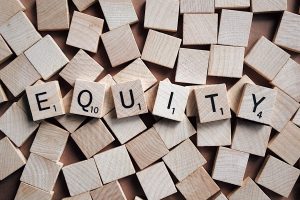
There are few options for those people who are looking to purchase an investment property with no deposit. This article is going to focus on one specific option: using the available equity in another property in place of a deposit. With some clever finance structuring, it’s possible to avoid the need for a cash deposit.
To be able to utilize the strategy in this article, you’re going to need to know how to calculate ‘usable equity’.  Click this link to learn how to calculate usable equity. Usable equity is important as this allows you to effectively obtain a no deposit investment loan.
Click this link to learn how to calculate usable equity. Usable equity is important as this allows you to effectively obtain a no deposit investment loan.
Let’s work through a scenario to help explain the concepts. We’ll assume that you have a property worth $600,000 with an outstanding home loan of $300,000. This means that there is $180,000 in usable equity. We arrive at this figure by:
(Property Value x 80%) – outstanding loan = available equity
($600,000 x 80%) – $300,000 = $180,000
So now that we know how much usable equity there is, how exactly do we use it as a deposit? Some people will ‘cross-securitise’ their property. This basically means that the existing lender will use the available equity to secure the investment loan. This doesn’t quite achieve our objective of having a no deposit investment home loan though – you are still likely to be required to put down a minimal cash deposit for the new investment property.
To truly achieve a ‘no deposit home loan’ – where you do not use any of your cash savings – you’ll need to use another strategy.
Another way to tap into usable equity is to use an equity access loan. This is a loan, usually by the same lender as your existing home loan, that allows you to ‘cash-out’ some of the equity. You can then use this cashed-out amount as the deposit for your new investment property.
Following on with the example above, there is $180,000 in usable equity. You may choose to cash out $125,000 of this amount so as not to stretch yourself to the limit. You intend to use $100,000 as a deposit and $25,000 in other costs (stamp duty, conveyancing/legal fees etc).
This means that you could purchase an investment property for $500,000 (assuming that you’re intending to keep your LVR below 80%).
So you’ve managed to cash out your equity and use this as a deposit, instead of using cash… but now you need to fund the remainder of the investment property purchase. The benefit of using the strategy detailed in this article is that it doesn’t handcuff you to the one lender.  You would need to use the same lender for your existing home loan and equity access loan but after that, you have a choice. You can use the same lender if they are going to help you achieve your long-term property goals, or you could approach another lender that is more appropriate for your goals.
You would need to use the same lender for your existing home loan and equity access loan but after that, you have a choice. You can use the same lender if they are going to help you achieve your long-term property goals, or you could approach another lender that is more appropriate for your goals.
I see too many people that tie multiple properties together in very complex lending arrangements. The end result is a lack of flexibility that means all the loans that are secured against the property are essentially handcuffed to the same bank. Usually, this occurs because you’ve approached a bank (and not a broker) and they have sold you into the bank’s own loans, using any structure necessary to get the application across the line. This helps your banker meet their sales target… but may not be in your best interest over the long-term. This is one reason we recommend you always use a broker… like us!
Continuing on with the example from above, you’ve used the equity access loan to pay the $100,000 deposit and kept $25,000 aside for stamp duty and other costs. Now you just need to worry about the other $400,000 (assuming that you’re purchasing a $500,000 property). You can apply for an investment loan through either the same lender or a different lender to finalise the purchase by obtaining a $400,000 loan.
It’s important to work with lenders that are flexible enough to allow you to achieve your financial goals.
It’s likely that there may be some funds left over from the cashed out funds as it can be hard to completely align the cash out with the property purchase. If this happens, you may consider investing it elsewhere. I mean if you borrowed the funds to invest, you may as well use it all to invest. Some options include shares, managed funds or ETFs. This investment will grow over time and is likely to compliment your new investment property.
As your needs evolve, you need to have a flexible finance structure. By adopting this approach, you will have flexible options if you ever need to refinance. You can choose to refinance the investment loan separate from the home loan and equity access loan. This means that you aren’t tied down to using one lender.
There may also be tax benefits by maximising the amount of lending that is used for investment purposes.
There are obvious benefits to investing as well. You’ll grow your asset base over time and will potentially generate additional income.
If you are considering your first investment, it is important to realise that investing is a journey. As with any journey, it’s best to  take some time to figure out where you want to go before taking the first step. The strategy detailed in this article is going to be appropriate for some people, however, for others, there may be other options to help them to get where they want to go. Because of this, it’s important to surround yourself with a team of professionals to help you identify the path forward and to support you on your journey.
take some time to figure out where you want to go before taking the first step. The strategy detailed in this article is going to be appropriate for some people, however, for others, there may be other options to help them to get where they want to go. Because of this, it’s important to surround yourself with a team of professionals to help you identify the path forward and to support you on your journey.
Some professionals you should be recruiting to your team include:
Session expired
Please log in again. The login page will open in a new tab. After logging in you can close it and return to this page.